反意疑问句的种种特殊情况归纳
几种特殊的反义疑问句----1
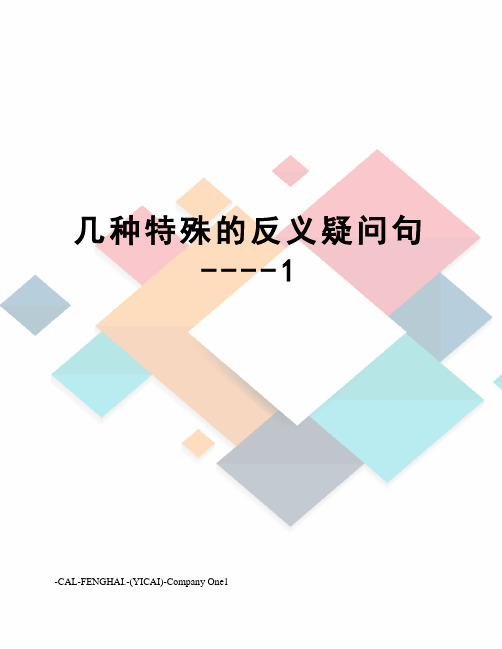
几种特殊的反义疑问句----1-CAL-FENGHAI.-(YICAI)-Company One1几种特殊的反义疑问句 1.祈使句。
祈使句后一般加上will you或won't you构成反意疑问句,用will you 多表示“请求”,用won't you 多表示提醒对方注意。
1)Let's...,后的反意疑问句用shall we或shan't we。
还可以用may I来表示征求对方的同意或许可。
2)Let us/me...后的反意疑问句用will you或won't you。
2.感叹句。
感叹句后加反意疑问句时,其反意疑问句需用be的一般现在时态的否定形式。
3. 当陈述部分谓语动词是need, dare, used to,且这些词被用作实义动词时,其反意疑问句需用do的适当形式。
4.陈述部分主、谓语是I am...时,反意疑问句用aren't I 或ain't I ,而不是am not I (可用am I not)。
5.陈述部分的主语是everything, nothing, anything或something 时,反意疑问句的主语应用代词it。
6.陈述部分的主语是 everybody, everyone, anybody, anyone, somebody, someone, nobody, no one, none, neither 时, 其反意疑问句的主语需用复数代词they。
7.陈述部分的主语是指示代词this或that时,反意疑问句的主语用it,当陈述部分的主语是指示代词these或those时,其反意疑问句的主语用they。
8.陈述部分的主语是不定代词one时,反意疑问句的主语可以用one,也可用you(美式英语用he)。
9.当陈述部分含有以下这些含有否定意义的词时:few, little, seldom,hardly, never, not, no, no one, nobody, nothing, none,neither等,其反意疑问句需用肯定结构。
九年级复习:反义疑问句的14种常考特殊用法
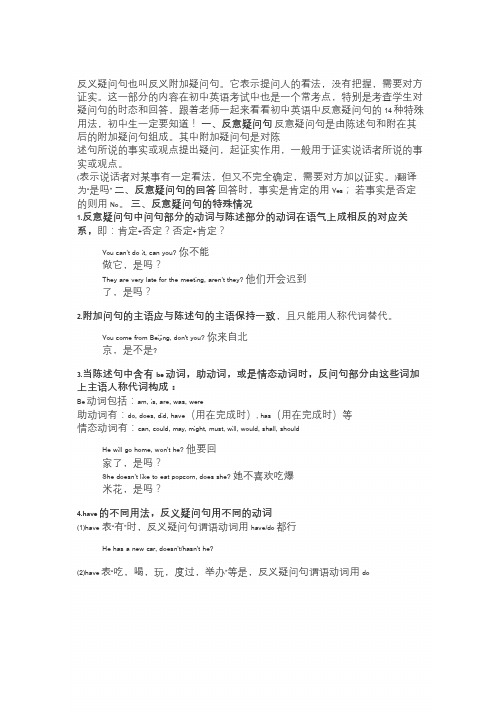
反义疑问句也叫反义附加疑问句。
它表示提问人的看法,没有把握,需要对方证实。
这一部分的内容在初中英语考试中也是一个常考点,特别是考查学生对疑问句的时态和回答,跟着老师一起来看看初中英语中反意疑问句的14种特殊用法,初中生一定要知道!一、反意疑问句反意疑问句是由陈述句和附在其后的附加疑问句组成。
其中附加疑问句是对陈述句所说的事实或观点提出疑问,起证实作用,一般用于证实说话者所说的事实或观点。
(表示说话者对某事有一定看法,但又不完全确定,需要对方加以证实。
)翻译为“是吗” 二、反意疑问句的回答回答时,事实是肯定的用Yes;若事实是否定的则用No。
三、反意疑问句的特殊情况1.反意疑问句中问句部分的动词与陈述部分的动词在语气上成相反的对应关系,即:肯定+否定?否定+肯定?You can’t do it, can you? 你不能做它,是吗?They are very late for the meeting, aren’t they? 他们开会迟到了,是吗?2.附加问句的主语应与陈述句的主语保持一致,且只能用人称代词替代。
You come from Beijing, don't you? 你来自北京,是不是?3.当陈述句中含有be动词,助动词,或是情态动词时,反问句部分由这些词加上主语人称代词构成:Be动词包括:am, is, are, was, were助动词有:do, does, did, have(用在完成时), has(用在完成时)等情态动词有:can, could, may, might, must, will, would, shall, shouldHe will go home, won’t he? 他要回家了,是吗?She doesn’t like to eat popcorn, does she? 她不喜欢吃爆米花,是吗?4.have的不同用法,反义疑问句用不同的动词(1)have 表“有”时,反义疑问句谓语动词用have/do都行He has a new car, doesn’t/hasn’t he?(2)have表“吃,喝,玩,度过,举办”等是,反义疑问句谓语动词用doHe has supper at home every day, doesn’t he?They had a good time in Beijing, didn’t they?(3)have to表“不得不,必须”时,反义疑问句谓语动词用doKite has to help her mother, doesn’t she?(4)had better表“最好”时,反义疑问句谓语动词用hadWe had better go to school at once, hadn't we?(5)have用在完成时中,反义疑问句谓语动词用haveThey have known the matter, haven’t they?5.(1)反意疑问句的陈述部分带有little, few, never, hardly, seldom,nobody,nothing, no one, none, neither等否定意义的词时,问句部分用肯定式。
反意疑问句
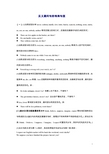
反义疑问句的特殊句型(一)(1)当陈述部分有never,seldom, hardly,few,little,barely, scarcely, nothing,none, rarely, no, not, no one, nobody, neither等否定意义的词汇时,后面的反意疑问句则为肯定形式:●There are few apples in the basket, are there?●He can hardly swim, can he?●They seldom come late, do they?(2)当陈述部分的主语为everyone, someone, anyone, no one, nobody等表示人的不定代词时,疑问部分的主语常用they:●Nobody came to see me while I was out, did they?(3)当陈述部分的主语为everything, something, anything, nothing等表示物的不定代词时,疑问部分的主语用it:●Something is wrong with your watch, isn’t it?(4)当陈述部分含有否定意思的词是unhappy, dislike, unfriendly,等含有否定词缀的派生词,也就是有un, dis-, no-前缀、less-后缀等含有词缀而意思否定的词,当做肯定句处理,疑问部分要用否定形式。
如:●He looks unhappy, doesn’t he? 他看上去不高兴,不是吗?●The girl dislikes history, doesn’t she? 这女孩不喜欢历史,不是吗?有less, fewer等词视为肯定词,疑问部分用否定形式。
如:●There will be less pollution, won't there?(二)表示主语主观意愿的词含有think, believe, suppose, imagine, expect等动词后接宾语从句构成的主从复合句在构成反意疑问句时,视情况不同有两种不同的构成方式。
英语20种特殊的反意疑问句
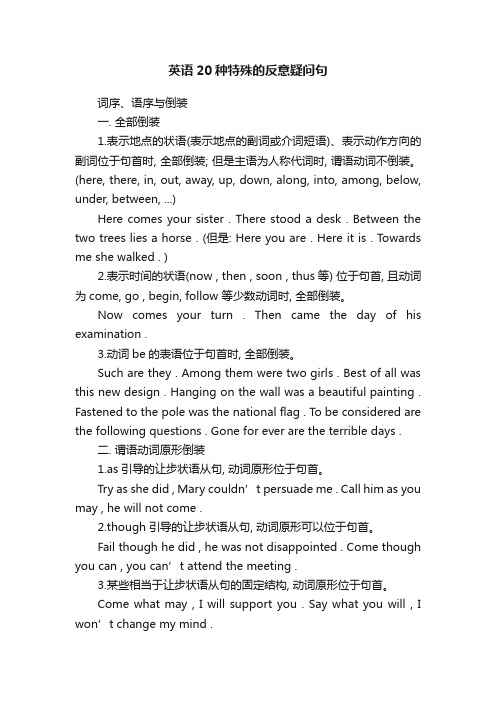
英语20种特殊的反意疑问句词序、语序与倒装一. 全部倒装1.表示地点的状语(表示地点的副词或介词短语)、表示动作方向的副词位于句首时, 全部倒装; 但是主语为人称代词时, 谓语动词不倒装。
(here, there, in, out, away, up, down, along, into, among, below, under, between, ...)Here comes your sister . There stood a desk . Between the two trees lies a horse . (但是: Here you are . Here it is . Towards me she walked . )2.表示时间的状语(now , then , soon , thus等) 位于句首, 且动词为come, go , begin, follow 等少数动词时, 全部倒装。
Now comes your turn . Then came the day of his examination .3.动词be的表语位于句首时, 全部倒装。
Such are they . Among them were two girls . Best of all was this new design . Hanging on the wall was a beautiful painting . Fastened to the pole was the national flag . To be considered are the following questions . Gone for ever are the terrible days .二. 谓语动词原形倒装1.as引导的让步状语从句, 动词原形位于句首。
Try as she did , Mary couldn’t persuade me . Call him as you may , he will not come .2.though引导的让步状语从句, 动词原形可以位于句首。
反义疑问句的14种常考特殊用法
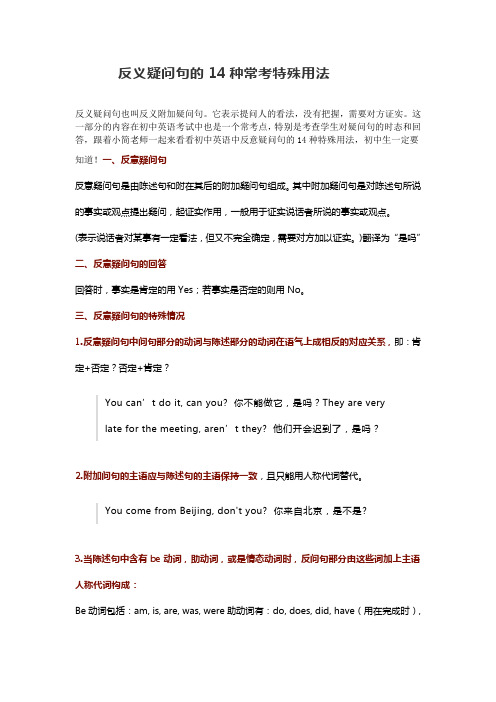
反义疑问句的14种常考特殊用法反义疑问句也叫反义附加疑问句。
它表示提问人的看法,没有把握,需要对方证实。
这一部分的内容在初中英语考试中也是一个常考点,特别是考查学生对疑问句的时态和回答,跟着小简老师一起来看看初中英语中反意疑问句的14种特殊用法,初中生一定要知道!一、反意疑问句反意疑问句是由陈述句和附在其后的附加疑问句组成。
其中附加疑问句是对陈述句所说的事实或观点提出疑问,起证实作用,一般用于证实说话者所说的事实或观点。
(表示说话者对某事有一定看法,但又不完全确定,需要对方加以证实。
)翻译为“是吗”二、反意疑问句的回答回答时,事实是肯定的用Yes;若事实是否定的则用No。
三、反意疑问句的特殊情况1.反意疑问句中问句部分的动词与陈述部分的动词在语气上成相反的对应关系,即:肯定+否定?否定+肯定?You can’t do it, can you? 你不能做它,是吗?They are verylate for the meeting, aren’t they? 他们开会迟到了,是吗?2.附加问句的主语应与陈述句的主语保持一致,且只能用人称代词替代。
You come from Beijing, don't you? 你来自北京,是不是?3.当陈述句中含有be动词,助动词,或是情态动词时,反问句部分由这些词加上主语人称代词构成:Be动词包括:am, is, are, was, were助动词有:do, does, did, have(用在完成时),has(用在完成时)等情态动词有:can, could, may, might, must, will, would, shall, shouldHe will go home, won’t he? 他要回家了,是吗?She doesn’tlike to eat popcorn, does she? 她不喜欢吃爆米花,是吗?4.have的不同用法,反义疑问句用不同的动词(1)have 表“有”时,反义疑问句谓语动词用have/do都行He has a new car, doesn’t/hasn’t he?(2)have表“吃,喝,玩,度过,举办”等是,反义疑问句谓语动词用doHe has supper at home every day, doesn’t he?They had agood time in Beijing, didn’t they?(3)have to表“不得不,必须”时,反义疑问句谓语动词用doKite has to help her mother, doesn’t she?(4)had better表“最好”时,反义疑问句谓语动词用hadWe had better go to school at once, hadn't we?(5)have用在完成时中,反义疑问句谓语动词用haveThey have known the matter, haven’t they?5.(1)反意疑问句的陈述部分带有little, few, never, hardly, seldom,nobody, nothing, no one, none, neither等否定意义的词时,问句部分用肯定式。
特殊反义疑问句的用法归纳总结

特殊反义疑问句的用法归纳总结特殊反义疑问句是英语语法中的一种特殊问句形式,它通常由肯定或否定的陈述句加上一个与之相对立的简化疑问句构成。
这种问句形式常用于询问对方的意见、确认事实或传递反讽等表达方式。
特殊反义疑问句在日常生活及各种交流场景中都被广泛使用,了解和掌握其正确的使用方法将有助于更准确地理解和运用英语。
一、特殊反义疑问句的构成特殊反义疑问句由两个部分组成:一个主陈述句和一个与之相对立的简化疑问句。
主陈述句通常由肯定或否定形式的陈述句构成,而简化疑问句则会根据主陈述句的情况选择合适的助动词。
1. 肯定主陈述句 + 否定简化疑问句例如:- You don't mind, do you?你不介意,对吧?- She doesn't like coffee, does she?她不喜欢咖啡,对吗?2. 否定主陈述句 + 肯定简化疑问句例如:- They aren't coming, are they?他们不会来,对吗?- He hasn't finished his homework, has he?他还没完成作业,对吧?二、特殊反义疑问句的用途特殊反义疑问句可用于以下情况:1. 确认或求证信息:这种用法常用于表达对方的观点、意见或确切信息的确认。
通过特殊反义疑问句,我们可以向对方提出一个问题,并期待得到一个确认或否定的回答。
例如:- You saw him yesterday, didn't you?昨天你见过他了是吗?- She loves playing the piano, doesn't she?她喜欢弹钢琴,是吗?2. 传递反讽或非正式语气:特殊反义疑问句还常被用于表达反讽、戏谑或带有非正式语气的情感。
这种使用方式可以通过明显与事实相悖的问题形式来达到一种幽默或讽刺的效果。
例如:- He's a genius, isn't he? (He's actually not very smart)他真是个天才,不是吗?(实际上他并不聪明)- This place is amazing, isn't it? (This place is actually terrible)这地方真是太棒了,不是吗?(实际上这地方糟透了)三、特殊反义疑问句的注意事项在正确使用特殊反义疑问句时,需要注意以下几点:1. 助动词选择:简化疑问句中的助动词应与主陈述句中的谓语动词形式一致。
反义疑问句特殊用法
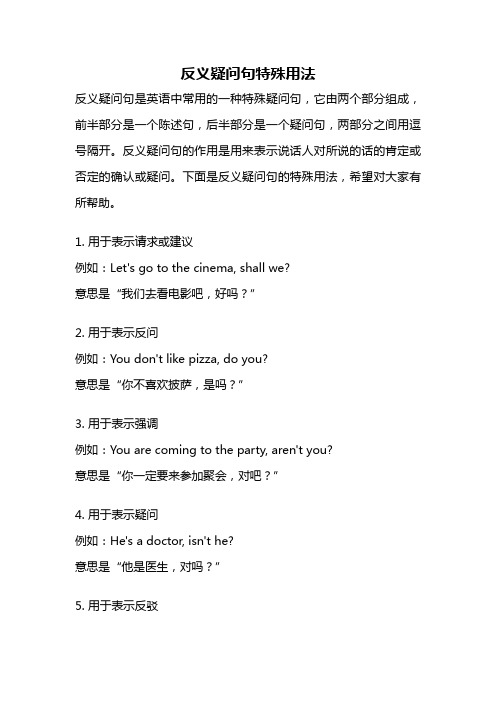
反义疑问句特殊用法反义疑问句是英语中常用的一种特殊疑问句,它由两个部分组成,前半部分是一个陈述句,后半部分是一个疑问句,两部分之间用逗号隔开。
反义疑问句的作用是用来表示说话人对所说的话的肯定或否定的确认或疑问。
下面是反义疑问句的特殊用法,希望对大家有所帮助。
1. 用于表示请求或建议例如:Let's go to the cinema, shall we?意思是“我们去看电影吧,好吗?”2. 用于表示反问例如:You don't like pizza, do you?意思是“你不喜欢披萨,是吗?”3. 用于表示强调例如:You are coming to the party, aren't you?意思是“你一定要来参加聚会,对吧?”4. 用于表示疑问例如:He's a doctor, isn't he?意思是“他是医生,对吗?”5. 用于表示反驳例如:You think I'm wrong, don't you?意思是“你认为我错了,不是吗?”6. 用于表示感叹例如:It's a beautiful day, isn't it?意思是“今天天气真好,不是吗?”7. 用于表示询问例如:You know how to swim, don't you?意思是“你会游泳,对吗?”8. 用于表示确认例如:You're not going to leave, are you?意思是“你不会离开,对吗?”9. 用于表示反问例如:You wouldn't do that, would you?意思是“你不会那样做,是吗?”10. 用于表示反驳例如:You don't really believe that, do you?。
反意疑问句的20种特例

反意疑问句的20种特例1当陈述部分的主语为:everybody, everyone, anybody, anyone, no one, nobody等表示人的不定代词时,附加问句的主语在日常英语中通常用they, 当陈述部分的主语为表示物的everything, anything, nothing等不定代词时,附加问句的主语在日常英语中通常用it而不用they。
(1)Everyone has been to Shanghai, haven’t they?(2)Nobody knows about it, do they?(3)Everything gets along quite well , isn’t it?2当陈述部分的主谓语结构为I wish ,用来表示征求或询问对方意见时,附加问句用May I: I wish to go skating with you, may I?3当陈述部分的主语为I , 谓语为am, 附加问句用aren’t I.I am doing well enough, aren’t I?I’m a real young man, aren’t I?4 陈述部分的主语有时与疑问部分不同,陈述部分的主语用I, 疑问部分主语用you.I think we must be off now, don’t you ?本句表示的不是‘是不是’而是What do you think?5 当陈述部分为There be 句型时,这时候疑问部分实际上并没有语法上的主语,而用引导词there 做主语。
T here is a ball on the table, isn’t there?There won’t be any difficulty, will there?6当陈述部分为并列句时,附加问句应与相邻的分句保持一致。
M ary have been doing her homework all morning, but she should finish doing it, shouldn’t she?7 当陈述部分为复合句时,附加问句应与主句保持一致。
特殊反义疑问句的用法归纳
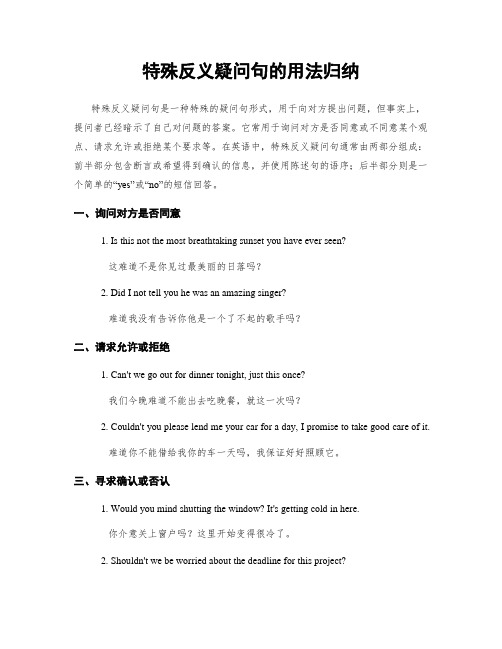
特殊反义疑问句的用法归纳特殊反义疑问句是一种特殊的疑问句形式,用于向对方提出问题,但事实上,提问者已经暗示了自己对问题的答案。
它常用于询问对方是否同意或不同意某个观点、请求允许或拒绝某个要求等。
在英语中,特殊反义疑问句通常由两部分组成:前半部分包含断言或希望得到确认的信息,并使用陈述句的语序;后半部分则是一个简单的“yes”或“no”的短信回答。
一、询问对方是否同意1. Is this not the most breathtaking sunset you have ever seen?这难道不是你见过最美丽的日落吗?2. Did I not tell you he was an amazing singer?难道我没有告诉你他是一个了不起的歌手吗?二、请求允许或拒绝1. Can't we go out for dinner tonight, just this once?我们今晚难道不能出去吃晚餐,就这一次吗?2. Couldn't you please lend me your car for a day, I promise to take good care of it.难道你不能借给我你的车一天吗,我保证好好照顾它。
三、寻求确认或否认1. Would you mind shutting the window? It's getting cold in here.你介意关上窗户吗?这里开始变得很冷了。
2. Shouldn't we be worried about the deadline for this project?我们难道不应该担心这个项目的截止日期吗?四、表达感叹或怀疑1. Isn't it unbelievable how fast technology is advancing these days?这天技术发展如此之快,真是令人难以置信啊!2. Hasn't he become such a talented musician in such a short time?他在如此短的时间内变成了一位如此有才华的音乐家,真让人惊讶!特殊反义疑问句在英语交流中起到了引导对话和确认观点的作用。
25种反义疑问句的特殊用法

25种反义疑问句的特殊用法(最新版)编制人:__________________审核人:__________________审批人:__________________编制单位:__________________编制时间:____年____月____日序言下载提示:该文档是本店铺精心编制而成的,希望大家下载后,能够帮助大家解决实际问题。
文档下载后可定制修改,请根据实际需要进行调整和使用,谢谢!并且,本店铺为大家提供各种类型的经典范文,如词性大全、句法大全、句型大全、从句大全、时态大全、语态大全、语法大全、虚拟语气、用法辨析、其他资料等等,想了解不同范文格式和写法,敬请关注!Download tips: This document is carefully compiled by this editor.I hope that after you download it, it can help you solve practical problems. The document can be customized and modified after downloading, please adjust and use it according to actual needs, thank you!In addition, this shop provides you with various types of classic sample essays, such as part of speech, syntax, sentence pattern, clause, tense, voice, grammar, subjunctive, usage analysis, other materials, etc. If you want to know the different formats and writing methods of the model essay, please pay attention!25种反义疑问句的特殊用法在反义疑问句中,简略问句的主语和谓语在人称和数方面要和前面的陈述句保持一致,但是,也有不少不一样的特殊情况,大致有25 种情况。
英语中反意疑问句的几种特殊情况说明

英语中反意疑问句的几种特殊情况说明在英语中,反意疑问句有以下几种特殊情况:1.当陈述部分no ,never ,hardly ,little ,few 等含有否定意义的词时简略句用否定形式,例如:The little boy can hardly speak ,can he ?2.陈述句的主语为名词或代词,简略问句的主语为相应的人称代词;陈述句的主语为指示代词this ,that ,不定代词something ,nothing 等,不定式,动名词或从句时,简略问句的主语为it;陈述句的主语为指示代词these ,those 不定代词everyone,nobody ,everyone等时,简略问句的主语为they ;陈述句为there be 句型时,简略问句中重复使用there 。
To see is to believe ,isn’t it ?There will be a meeting tomorrow ,won’t there ?3.陈述部分是复合句时,简略问句的主语与助动词和主句一致。
例如:She lived in Beijing when she was young ,didn’t she ?但如果主句的谓语动词是think , suppose ,believe ,imagine ,expect ,feel等,且主语为第一人称或第二人称时,简略问句的主语和时态却要和宾语从句一致,而肯定和否定,则要与主句一致。
例如: I don’t think you are a student , are you ?4.祈使句也可加简略问句,不表示反意,只表示语气。
否定祈使句+ will you ?肯定祈使句+ won’t you ?(表示邀请)—1—肯定祈使句+ will you ?(表示请求)Let’t (包括对方)+ …,shall we ?(表示建议)Let us (不包括对方)+ …,will you ?(表示请求)Let +第三人称+ …,will you ?—2—。
反义疑问句特殊用法总结
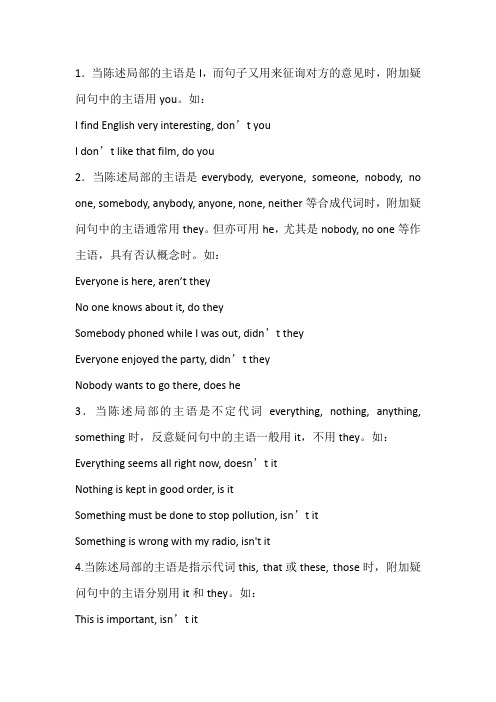
1.当陈述局部的主语是I,而句子又用来征询对方的意见时,附加疑问句中的主语用you。
如:I find English very interesting, don’t youI don’t like that film, do you2.当陈述局部的主语是everybody, everyone, someone, nobody, no one, somebody, anybody, anyone, none, neither等合成代词时,附加疑问句中的主语通常用they。
但亦可用he,尤其是nobody, no one等作主语,具有否认概念时。
如:Everyone is here, aren’t theyNo one knows about it, do theySomebody phoned while I was out, didn’t theyEveryone enjoyed the party, didn’t theyNobody wants to go there, does he3.当陈述局部的主语是不定代词everything, nothing, anything, something时,反意疑问句中的主语一般用it,不用they。
如:Everything seems all right now, doesn’t itNothing is kept in good order, is itSomething must be done to stop pollution, isn’t itSomething is wrong with my radio, isn't it4.当陈述局部的主语是指示代词this, that或these, those时,附加疑问句中的主语分别用it和they。
如:This is important, isn’t itThat isn’t correct, is itThis is a plane, isn't itThese are grapes,aren't theyThese are your friends Tom and Jack, aren’t they5.如果陈述局部是以代词one作主语,附加疑问句中的主语在正式场合用one,非正式场合用you,在美国英语中,在非正式场合还可以用he。
反义疑问句的八种特殊形式

反义疑问句的八种特殊形式
1. 前面句子为肯定句,后面为否定疑问句。
如:You like coffee, don't you?(你喜欢咖啡,不是吗?)
2. 前面句子为否定句,后面为肯定疑问句。
如:You don't like coffee, do you?(你不喜欢咖啡,是吗?)
3. 前面句子为肯定且含有否定意义词语,后面为否定疑问句。
如:He hardly ever studies, does he?(他几乎不学习,对吧?)
4. 前面句子为否定且含有肯定意义词语,后面为肯定疑问句。
如:He didn't say anything, did he?(他没说什么,是吗?)
5. 前面句子为陈述句,后面为感叹疑问句。
如:You won the game, didn't you?!(你赢了比赛,是吧!)
6. 前面句子为感叹句,后面为肯定疑问句。
如:What a beautiful day it is, isn't it?(多美的一天啊,是吧?)
7. 前面句子为陈述句,后面为强调疑问句。
如:He is a doctor, isn't he?(他是医生,对吧?)
8. 前面句子为陈述句,后面为选择疑问句。
如:Do you want tea or coffee, don't you?(你想要茶还是咖啡呢?)。
反义疑问句的14种常考特殊用法
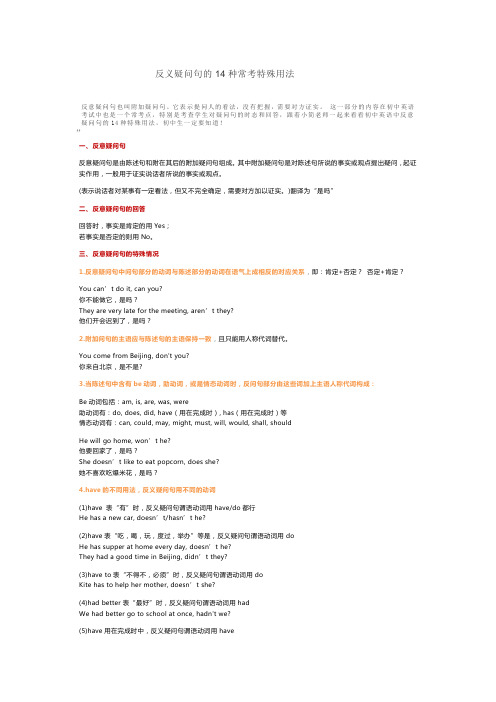
反义疑问句的14种常考特殊用法反意疑问句也叫附加疑问句。
它表示提问人的看法,没有把握,需要对方证实。
这一部分的内容在初中英语考试中也是一个常考点,特别是考查学生对疑问句的时态和回答,跟着小简老师一起来看看初中英语中反意疑问句的14种特殊用法,初中生一定要知道!”一、反意疑问句反意疑问句是由陈述句和附在其后的附加疑问句组成。
其中附加疑问句是对陈述句所说的事实或观点提出疑问,起证实作用,一般用于证实说话者所说的事实或观点。
(表示说话者对某事有一定看法,但又不完全确定,需要对方加以证实。
)翻译为“是吗”二、反意疑问句的回答回答时,事实是肯定的用Yes;若事实是否定的则用No。
三、反意疑问句的特殊情况1.反意疑问句中问句部分的动词与陈述部分的动词在语气上成相反的对应关系,即:肯定+否定?否定+肯定?You can’t do it, can you?你不能做它,是吗?They are very late for the meeting, aren’t they?他们开会迟到了,是吗?2.附加问句的主语应与陈述句的主语保持一致,且只能用人称代词替代。
You come from Beijing, don't you?你来自北京,是不是?3.当陈述句中含有be动词,助动词,或是情态动词时,反问句部分由这些词加上主语人称代词构成:Be动词包括:am, is, are, was, were助动词有:do, does, did, have(用在完成时), has(用在完成时)等情态动词有:can, could, may, might, must, will, would, shall, shouldHe will go home, won’t he?他要回家了,是吗?She doesn’t like to eat popcorn, does she?她不喜欢吃爆米花,是吗?4.have的不同用法,反义疑问句用不同的动词(1)have 表“有”时,反义疑问句谓语动词用have/do都行He has a new car, doesn’t/hasn’t he?(2)have表“吃,喝,玩,度过,举办”等是,反义疑问句谓语动词用doHe has supper at home every day, doesn’t he?They had a good time in Beijing, didn’t they?(3)have to表“不得不,必须”时,反义疑问句谓语动词用doKite has to help her mother, doesn’t she?(4)had better表“最好”时,反义疑问句谓语动词用hadWe had better go to school at once, hadn't we?(5)have用在完成时中,反义疑问句谓语动词用haveThey have known the matter, haven’t they?5.(1)反意疑问句的陈述部分带有little, few, never, hardly, seldom,nobody, nothing, no one, none, neither 等否定意义的词时,问句部分用肯定式。
初中英语18种特殊的反意疑问句
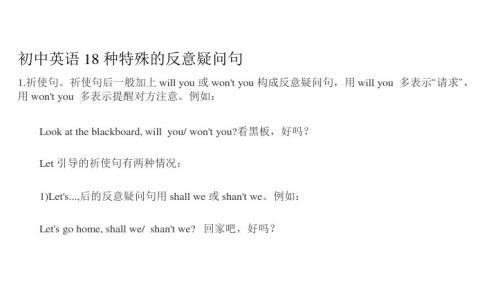
12.当陈述部分主语是从句、不定式(短语)、动词-ing 形式时,反意疑问句的主语应该用 it。 例如: What you need is more important, isn't it?你需要的东西更重要,是吧? 13.当陈述部分含 I think (believe, suppose...)that... 结构时,其反意疑问句须与从句的 主、谓语保持一致,注意主句的主语必须是第一人称。例如: I don't think he will come, will he? 我认为他不会来,对吗? 14.have(has)不是表示“有”的意思,并在句中做谓语时,其反意疑问句的助动词要用 do,
Something is wrong with my radio, isn't it? 我的收音机出毛病了,是吧? 6.陈述部分的主语是 everybody, everyone, anybody, anyone, somebody, someone, nobody, no one, none, neither 时, 其反意疑问句的主语需用复数代词 they。例如: Everyone is here, aren't they? 大家都到了,是吗? No one knows about it, do they? 没有人知道这件事,对吗? 7.陈述部分的主语是指示代词 this 或 that 时,反意疑问句的主语用 it,当陈述部分的主语是 指示代词 these 或 those 时,其反意疑问句的主语用 they。例如:
He is never late for school, is he? 他上学从不迟到,是吗? 10.当陈述部分所含的否定词是通过加前缀或后缀构成的,其后的反意疑问句依然用否定结构。 例如: It is unfair, isn't it? 这不公平,是吧? 11.含有否定含义的词在陈述部分作动词的宾语时,其反意疑问句用肯定结构,也可以用否定 结构。例如: You got nothing from him, did you? 你从他那儿什么也没得到,是吗?
反义疑问句

反义疑问句的12种特殊句型1.在由祈使句+疑问部分构成的反义疑问句中,疑问部分通常用will you, won’t you, would you,有时也可以用can you , can’t you, why don’t you, could you等,但不用do,即使祈使句中有助动词do 时也是这样,Pass me the dictionary, will (would)you?Don’t do that again, will you?在含有let的祈使句后的反义疑问句部分,如果let 的宾语us包括听者(常写为let’s)时用shall we,不包括听者(常写为let us)时用will you. Let的宾语是me时,要根据意思用will you或may I 。
let 的宾语是第三人称时用will you .Let him speak first,will you ?2.当陈述部分带有情态动词must 时,反义疑问部分要根据Must的意思不同而有所变化。
如果must 表示必须,有必要时,反义疑问部分用musn’t 或neen’t .如I must hand in my exercise book now,must’t I (needn’t I )?如果must n’t 表示禁止时,疑问部分一般用mustYou mustn’t take the magazine out of the reading room,must you ?若must 表示想必,一定等推测意义时,则疑问部分不用must,而要根据must 之后的动词结构及含义使用相应的动词形式。
如:He must be your English teacher, isn’t he ?Chinese must have the largest number of speakers, doesn’t it ?You must have read read the book yesterday , didn’t he?3.当陈述部分的主语为nothing , anything, everything等不定代词时,反义疑问部分主语用it ,如:Nothing could prevent him from going there, could it?如果陈述部分的主语为nobody,somebody,none,someone,no one,anyone,anybody,everyone等不定代词,反义疑问部分主语用they 或he,如:Somebody took my umbrella away yesterday, didn’t they/he ?4.当陈述部分带有that从句作宾语时,反义疑问部分应与主句的主语和谓语一致。
反义疑问句用法归纳详解

反义疑问句用法归纳详解反义疑问句也叫反义附加疑问句。
它表示提问人的看法,没有把握,需要对方证实。
这一部分的内容在初中英语考试中也是一个常考点,特别是考查学生对疑问句的时态和回答,跟着老师一起来看看初中英语中反意疑问句的14种特殊用法,初中生一定要知道!一、反意疑问句反意疑问句是由陈述句和附在其后的附加疑问句组成。
其中附加疑问句是对陈述句所说的事实或观点提出疑问,起证实作用,一般用于证实说话者所说的事实或观点。
(表示说话者对某事有一定看法,但又不完全确定,需要对方加以证实。
)翻译为“是吗”二、反意疑问句的回答回答时,事实是肯定的用Yes;若事实是否定的则用No。
三、反意疑问句的特殊情况1.反意疑问句中问句部分的动词与陈述部分的动词在语气上成相反的对应关系,即:肯定+否定?否定+肯定?You can’t do it, can you?你不能做它,是吗?They are very late for the meeting, aren’t they?他们开会迟到了,是吗?2.附加问句的主语应与陈述句的主语保持一致,且只能用人称代词替代。
You come from Beijing, don't you?你来自北京,是不是?3.当陈述句中含有be动词,助动词,或是情态动词时,反问句部分由这些词加上主语人称代词构成:Be动词包括:am, is, are, was, were助动词有:do, does, did, have(用在完成时), has(用在完成时)等情态动词有:can, could, may, might, must, will, would, shall, should He will go home, won’t he?他要回家了,是吗?She doesn’t like to eat popcorn, does she?她不喜欢吃爆米花,是吗?4.have的不同用法,反义疑问句用不同的动词(1)have 表“有”时,反义疑问句谓语动词用have/do都行He has a new car, doesn’t/hasn’t he?(2)have表“吃,喝,玩,度过,举办”等是,反义疑问句谓语动词用doHe has supper at home every day, doesn’t he?They had a good time in Beijing, didn’t they?(3)have to表“不得不,必须”时,反义疑问句谓语动词用doKite has to help her mother, doesn’t she?(4)had better表“最好”时,反义疑问句谓语动词用hadWe had better go to school at once, hadn't we?(5)have用在完成时中,反义疑问句谓语动词用haveThey have known the matter, haven’t they?5.(1)反意疑问句的陈述部分带有little, few, never, hardly, seldom,nobody, nothing, no one, none, neither等否定意义的词时,问句部分用肯定式。
英语反义疑问句的用法归纳总结
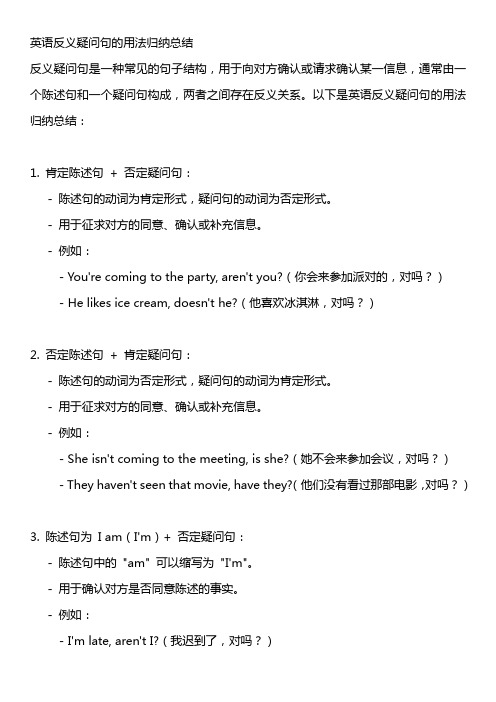
英语反义疑问句的用法归纳总结反义疑问句是一种常见的句子结构,用于向对方确认或请求确认某一信息,通常由一个陈述句和一个疑问句构成,两者之间存在反义关系。
以下是英语反义疑问句的用法归纳总结:1. 肯定陈述句+ 否定疑问句:- 陈述句的动词为肯定形式,疑问句的动词为否定形式。
- 用于征求对方的同意、确认或补充信息。
- 例如:- You're coming to the party, aren't you?(你会来参加派对的,对吗?)- He likes ice cream, doesn't he?(他喜欢冰淇淋,对吗?)2. 否定陈述句+ 肯定疑问句:- 陈述句的动词为否定形式,疑问句的动词为肯定形式。
- 用于征求对方的同意、确认或补充信息。
- 例如:- She isn't coming to the meeting, is she?(她不会来参加会议,对吗?)- They haven't seen that movie, have they?(他们没有看过那部电影,对吗?)3. 陈述句为I am(I'm)+ 否定疑问句:- 陈述句中的"am" 可以缩写为"I'm"。
- 用于确认对方是否同意陈述的事实。
- 例如:- I'm late, aren't I?(我迟到了,对吗?)4. 陈述句中有情态动词+ 肯定疑问句:- 陈述句中有情态动词(如can, could, will, would, should, must等),疑问句的情态动词要与陈述句保持一致。
- 用于确认对方是否同意或能够遵从陈述中的情态动词。
- 例如:- He can swim, can't he?(他会游泳,对吗?)- You will help me, won't you?(你会帮助我,对吗?)5. 陈述句中没有情态动词+ 肯定疑问句:- 陈述句中没有情态动词,疑问句使用"do/does/did" 作为助动词,并保持句子时态一致。
- 1、下载文档前请自行甄别文档内容的完整性,平台不提供额外的编辑、内容补充、找答案等附加服务。
- 2、"仅部分预览"的文档,不可在线预览部分如存在完整性等问题,可反馈申请退款(可完整预览的文档不适用该条件!)。
- 3、如文档侵犯您的权益,请联系客服反馈,我们会尽快为您处理(人工客服工作时间:9:00-18:30)。
反意疑问句的种种特殊情况归纳反意疑问句的一般构成规则,大家比较熟悉,也较容易掌握,不需赘述。
但是,任何规则都有例外。
一、如果陈述部分是something, anything, nothing, everything等不定代词作句子主语时,疑问部分的主语用“it”代替;如果陈述部分的主语是someone (somebody), anyone (anybody), no one(nobody),everyone (everybody)等不定代词时,疑问部分的主语用“they”代替。
例如:Everything goes very well, doesn’t it?Something is wrong with that TV set, isn’t it?Someone stole my watch, didn’t they?Everyone went to the zoo last Sunday, didn’t they?Nobody is late for school, are they?注:nothing在陈述部分中若做主语时,疑问部分用肯定形式,若做宾语或表语时,疑问部分用肯定形式或否定形式均可。
例如:Nothing happens, does it? (nothing 做主语)The manager knew nothing about that project, did/didn’t he? (nothing做宾语)She is nothing to me, is/isn’t she? (nothing做表语)二、若陈述部分的主语是this, that时,疑问部分的主语用“it”代替;若陈述部分的主是these, those时,则疑问部分的主语用“they”代替。
例如:This is an interesting story, isn’t it?Those are your classmates, aren’t they?三、若陈述部分的主语是动词不定式、动名词及从句时,疑问部分的主语用“it”代替。
例如:To learn English well is very important, isn’t it?Seeing is believing, isn’t it?What we need most now is more money, isn’t it?四、若陈述部分的主语是one时,疑问部分的主语常用“one”代替,偶尔用“you”代替。
例如:One can’t know what will happen in the future, can one? /can you?One should learn more knowledge now, shouldn’t one? /shouldn’t you?五、若陈述部分是“There be”句型结构时,疑问部分的主语用“there”;若“there”是和其他成分构成倒装句型时,疑问部分则根据主语的人称和数的一致原则而定。
例如:There are some foreign teachers in their school, aren’t there?There will be a football match, won’t there?There goes the bell, doesn’t it?There comes the bus, doesn’t it?There stand/lie several tall buildings at the foot of the mountain, don’t they?六、若陈述部分是由neither…nor…, either…or…, both…and…, not only…but also…等连词连接的两个名词或代词做句子主语时,疑问部分的主语用复数代词代替。
例如:Both Lucy and Lily came to this party, didn’t they?Not only Kate but also Jane likes dancing, don’t they?Either you or Li Ping is going to the meeting, aren’t you?七、若陈述部分的主语是“the +形容词”表一类人时,疑问部分的主语用代替;若是表某一抽象概念时,疑问部分的主语用“it”代替。
例如:The rich are not always very happy, are they?The young should respect the old, shouldn’t they?The beautiful isn’t always good, is it?八、有时,陈述部分的主语是单数还是复数,较难判断,判断清楚以后,疑问部分的主语在人称和数方面要与陈述部分的主语保持一致。
例如:One of the policewomen is standing over there, isn’t she?The actress and director decides to sing us a song, doesn’t she?The writer and the teacher will come to give us a talk next week, won’t they?Her brother’s name is Li Ming, isn’t it?九、当陈述部分是由“I’m sure that; I’m afraid that; We are sure that; We are afraid that; I feel sure that; I hope that; We feel sure that; It seems that”等句型构成时,因主要意思在从句,故疑问部分的主语要与从句的主语保持一致。
例如:I’m sure that you know him well, don’t you?I’m afraid that he hasn’t finished that work, has he?I hope you don’t mind my speaking frankly, do you?It seems that you are an expert, aren’t you?十、若陈述部分以第一人称主语“I/We don’t think (expect, believe, guess, imagine, suppose等+that-clause”时,反意疑问句要与从句保持一致;若陈述部分是由其他人称代词做主语,反意疑问句则仍与主句保持一致。
例如:I don’t think that she can come, can she?We don’t think that it will rain tomorrow, will it?They don’t think she knew anything about it, do they?He doesn’t suppose that you are a great success, does he?You don’t think that I can swim, do you?十一、有时,虽然陈述部分用第一人称代词做句子主语,但反意疑问句的疑问部分是表示征求别人的意见,此时,反意疑问句的疑问部分实际上相当于另一个句子,含义相当于What\How about you?或者What do you think?.注意仔细体会。
例如:I find this lesson is too difficult, don’t you? (=What /How about you?)I believe he is right, don’t you? (=What about you?)I think she is very friendly to us, don’t you? (= What do you think?)I don’t suppose he will win this game, do you?(=What do you think?)十二、若陈述部分是“I am…”时,疑问部分用“aren’t I”?若陈述部分是“I’m not…”时,则疑问部分用“am I?”.例如:I am foolish, aren’t I?I’m not careful enough, am I?十三、若陈述部分为“I/We wish…”时,反意疑问句的疑问部分用“may I/we?”;但若句子主语是第二、三人称代词时,反意疑问句的疑问部分则根据人称代词选择适当的助动词。
例如:I wish to visit the Great Wall, may I?I wish I could fly to the moon one day, may I?Tom wishes to go abroad, doesn’t he?You wish to make friends with us, do you?十四、若陈述部分含有否定意义的词如“no, never, seldom, hardly, none, few, little, rarely, scarcely, neither, neither…nor…,too…to…”等时,反意疑问句的疑问部分则用肯定形式。
例如:He has never been to Beijing, has he?There is little rain this year, is there?He is too young to look after himself, is he?She is seldom late for school, is she?注1:在"too…to…”句型中若用形容词"glad, pleased, ready, eager”等时,不适用这一原则,因为此时并非表示“否定“含义,对于这点要特别注意。
例如:He is too eager to join the army, isn’t he?She is too glad to receive a doctor’s degree, isn’t she?注2:若否定含义是通过使用前缀(如:un-, in-, im-, dis-,)和后缀(如-less,)等构成时,其反意疑问句的疑问部分仍用否定形式。
例如:You are unfair, aren’t you?He dislikes these ways, doesn’t he?十五、若陈述部分"have"表“所有”含义时,疑问部分可用“have”或“do”的相应形式;若表示“经历、遭受、得到、吃”等含义时,疑问部分只能用“do”的相应形式。
